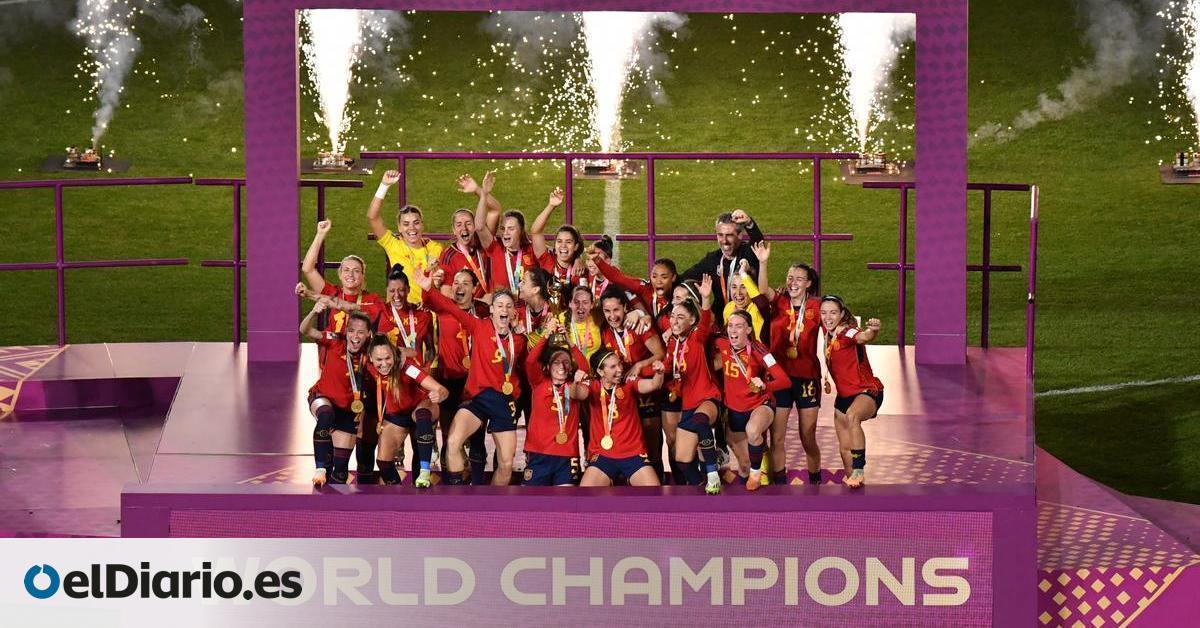
Jenni Hermoso denies that Luis Rubiales’ kiss was consented to. She does it supported by all her teammates, who renounce to return to the national team until there are no changes in the leadership of the Federation, as they say in a statement released by the Futpro union and advanced by the Visibilitas women’s soccer website. The announcement comes hours after the speech that Luis Rubiales has made before the assembly of the Spanish Football Federation, a speech in which he has refused to resign, has charged against feminism and has assured that Jenni Hermoso was the one who approached him.
Champions despite machismo: the history of discrimination and conflicts behind the success of the national team
Further
All the players of the current team sign the statement, show their support for Jenni Hermoso and renounce to return to the national team “if the current leaders continue.” The 23 world champions are joined by almost 50 players or former players, such as Vero Boquete, Sandra Paños, Mapi León or Natalia Pablos, and some historic women’s soccer players such as Carmen Arce ‘Kubalita’.
“I want to clarify that at no time did I consent to the kiss he gave me and in no case did I seek to raise the president. I do not tolerate that my word is questioned, much less that words are invented that I have not said, ”says Jenni Hermoso in the joint statement. If Rubiales assured in his morning appearance that the kiss to the player was “mutual and consented”, Hermoso now makes it clear that “as seen in the images” it was not like that and “at no time” did he consent to the kiss. A couple of hours after that statement, the player made another public, this time individual, in which she went even further: “I want to reiterate, as I did at the time, that this fact had not been to my liking. The situation caused me a shock due to the context of celebration (…). I felt vulnerable and the victim of aggression, an impulsive, sexist, out of place act and without any kind of consent on my part. I just wasn’t respected.”
“I do not tolerate that my word is questioned, much less that words are invented that I have not said ”, Hermoso also stressed. On Monday, the Federation issued a statement that attributed to the soccer player a few words in which he downplayed what happened. Information from the media ‘Relevo’ He assured, however, that the Federation had invented that reaction of the player, something that the body chaired by Rubiales denied. The soccer player makes it clear in her individual statement that these statements did not come out of her mouth. Hermoso recounts that, indeed, they asked her to make a joint statement with Rubiales that she rejected and that both she and her family and those around her have received “continuous pressure” to give a testimony that “had nothing to do” with her experience.
The current world champions say they expect “forceful responses from the public powers so that actions such as those contained do not go unpunished.” They also ask for “real changes, both sporting and structural, that help the National Team to continue growing, in order to be able to transfer this great success to later generations.” “It fills us with sadness that such an unacceptable event is managing to tarnish the greatest sporting success of Spanish women’s football,” they say.
Among those who subscribe to the text are the 15 soccer players who sent an email to the Federation a year ago to complain about some events that had affected their health and who announced their resignation from the national team under these conditions. After some changes, seven of them requested their return and only three were called up for this World Cup: Ona Batlle, Aitana Bonmatí and Mariona Caldentey.
“From our union we want to emphasize that no woman should feel the need to respond to the forceful images that the whole world has seen and of course, they should not be involved in non-consensual attitudes,” reads the statement.
🚨 The players of the @SEFutbolFemworld champions and other soccer players, in support of @Jennihermoso express their firm condemnation of behaviors that have violated the dignity of women.
The statement is open to footballers who want to join#it’s over pic.twitter.com/PW91SW9Ts0— FUTPRO (@futpro_es) August 25, 2023
A chain reaction
The triumph of the women’s team, of sporting and social significance, was marred by the forced kiss that the president of the Federation gave soccer player Jenni Hermoso during the medal ceremony. The discomfort for what happened broke out that same Sunday and went around the world, and forced Luis Rubiales to record a video with some decaffeinated apologies that added fuel to the fire. During the week, the reactions and actions followed one another. Added to the social and political reproach were three complaints against Luis Rubiales before the Higher Sports Council and the communiqués from Jenni Hermoso’s union, Futpro, and the Women’s League asking for strong actions against Rubiales.
However, on Friday morning the president of the Federation refused to resign and launched a speech that charged against feminism and focused on Jenni Hermoso. Shortly after her intervention, the barrage of reactions from the national team players began on social networks. The first was Alexia Putellas, twice Ballon d’Or: “This is unacceptable. It’s over. With you, partner Jenni Hermoso”. Aitana Bonmatí followed – “There are limits that cannot be crossed and we cannot tolerate this. We are with you, partner”– or Athenea del Castillo. Also the goalkeeper Cata Coll: “What a pity it makes me that 23 footballers are not the protagonists… it’s over! With you to death Jenni Hermoso”.
Olga Carmona, Irene Paredes, Misa Rodríguez, Ona Batlle, Laia Codina, Mariona Caltendey and Alba Redondo published messages in the same vein. Other relevant soccer players who have played with the national team, such as Vicky Losada or Natalia Pablos, also spoke. The collective reaction was brewing.
Already during the celebration this Monday in Madrid, some of the most relevant footballers of the national team, such as Alexia Putellas or Aitana Bonmatí, did not want to speak. The faces and attitude of some of them, avoiding Rubiales or keeping their distance from Vilda, were eloquent.
The 15 o’clock rebellion
Among the expressions of support for Jenni Hermoso and the national team, those of some international soccer players, such as Megan Rapinoe, former captain of the US national team, stood out this week. Rapinoe pointed out Rubiales’ gesture as part of the “misogyny and sexism” of soccer. “Think of everything that Spanish team has had to endure: some of the players who demonstrated last year [para protestar contra los malos tratos] They are not yet in the team, ”he said.
Rapinoe was referring to that rebellion of 15 national team players who just a year ago sent, one by one, the same email to the Federation to communicate that due to the “latest events” their health was affected and they were not , therefore, “in a position” to be selectable players. The emails from the soccer players suggested a serious internal conflict but did not specify the specific facts for which they were protesting.
“I hereby inform you that due to the latest events that have occurred in the Spanish team and the situation generated, facts of which you are aware, they are significantly affecting my emotional state and therefore my health. Due to all this, I currently do not see myself in a position to be a selectable player for our national team and for this reason I request not to be called up until this situation is reversed. My commitment to the team in the past, present and future was, is and will be absolute”, they said.
Rubiales’ reaction was very critical of the soccer players and, on the contrary, he supported Vilda. The sports press then branded the players as blackmailers and capricious. However, after meetings and approaches, in May of this year eight of those 15 players sent a new email to notify them of their availability. The Federation had set as a condition to return to the team to communicate it by the same channel that they had used to transmit their discomfort. Only three of them were finally summoned by Vilda: Ona Batlle, Aitana Bonmatí and Mariona Caldentey. Another seven decided not to ask for their return.
The soccer players managed to improve some of their conditions, for example, having a nutritionist for the first time and having more physiotherapists, flying on charter flights, or having a reconciliation plan that has allowed them to be close to family and loved ones and share time with them during the World Cup. However, most of the soccer players who decided not to send the emails required by the Federation have remained silent during this World Cup.
Source: www.eldiario.es

